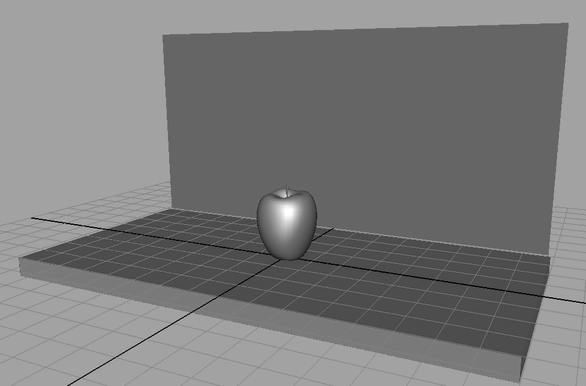A shading material is
a collection of attributes that you apply to a surface to control
how the surface appears when it is rendered. Shading materials include
such attributes as color, shininess, and texture. The following
table outlines the materials you’ll be working with:
| Material |
Description |
Lambert
|
Creates a matte surface
without specular highlights. Lambert is the default shading material.
|
Blinn
|
Creates a shiny surface
with specular highlights, often used to simulate metallic surfaces.
|
When you open the apple.ma file, it initially displays
the apple and the planes as wireframes (Shading > Wireframe).
This is the default display mode for objects in a scene view.
To create materials for the apple stem
- In the perspective view, select Shading
> Smooth Shade All (hotkey: 5).
The apple and the other
surfaces appear with a default gray, smooth shading material, lit
using default lighting. Default lighting occurs when no other lights
have been placed in the scene.
- In the perspective view, select the apple
stem by clicking its geometry. (Be sure that only the apple stem
is selected.)
- From the Rendering menu
set, select
Lighting/shading > Assign New Material.
The Assign
New Material window appears.
- Click Lambert.
The Attribute
Editor appears for the Lambert material.
A Lambert material
creates a matte surface without shiny highlights. You will learn
more about materials and their attributes in a later lesson.
- Click the gray box to the right of Color.
The Color
Chooser window appears.
- Click inside the color wheel and drag
to a brown color.
The color you select
in the Color Chooser is applied to
the apple stem.
Move your mouse off the Color
Chooser to exit.
- In the Attribute Editor,
rename the lambert shading material to appleStem_lambert.
To create materials for the apple
- Right-click the apple and select Assign
New Material from the marking menu.
The Assign
New Material window appears.
- Select Blinn.
The Attribute
Editor updates to display the attributes for the Blinn material.
A Blinn material
gives the apple a shiny appearance.
- Click the gray box to the right of Color.
The Color
Chooser window appears.
- Click inside the color wheel and drag
to a red color.
The apple’s surface updates
to the same color you select in the Color Chooser.
- In the Attribute Editor,
rename the Blinn shading material to appleSkin_blinn.
To create materials for the counter and
wall
- Right-click the background plane and
select Assign New Material from the marking
menu.
The Assign
New Material window appears.
- Select Lambert.
The Attribute
Editor displays the attributes for the Lambert material.
- Click the gray box to the right of Color.
- In the Color Chooser window,
click inside the color wheel and drag to a light blue color.
The color you select
in the Color Chooser is applied to
the plane.
- In the Attribute Editor,
rename the Lambert shading material to wall_lambert.
- Right-click the surface that the apple
is resting on and select Assign New Material
> Lambert.
The Attribute
Editor displays the attributes for the Lambert material.
- Click the gray box to the right of Color.
- In the Color Chooser window,
click inside the color wheel and drag to a beige color.
The color you select
in the Color Chooser is applied to
the plane.
- In the Attribute Editor,
rename the Lambert shading material to counter_lambert.
The counter, wall, and
apple stem all have a matte Lambert surface,
while the apple has a shiny Blinn surface.
There are many other attributes you can set to change the appearance
of these objects, which you’ll explore in the next section.




